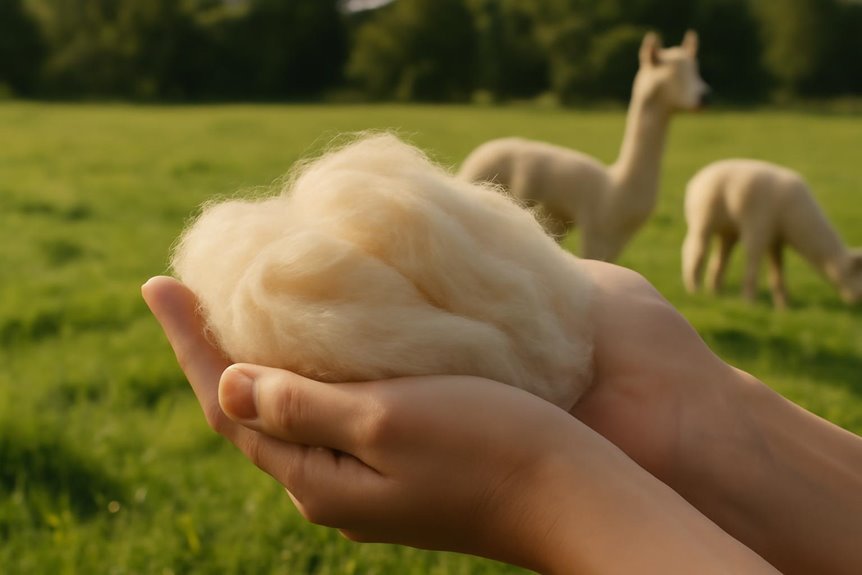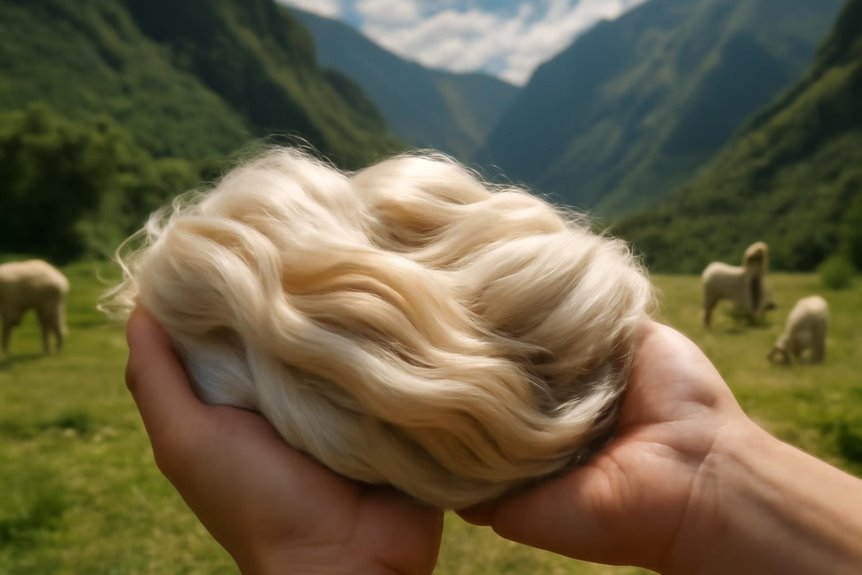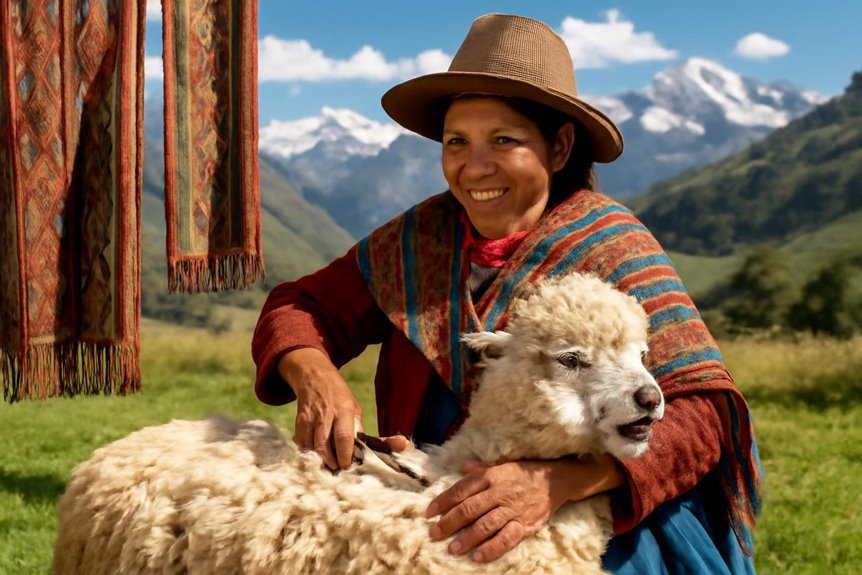Why Choose Eco-Friendly Alpaca Fiber Methods?
You’ll want eco-friendly alpaca fiber methods because they offer a sustainable alternative to synthetic fibers, using less water, land, and chemicals. Alpacas have a low environmental impact with natural grazing that preserves soil and reduces emissions. Their soft, durable fiber is hypoallergenic, breathable, and biodegradable, so it’s healthier for you and the planet. Plus, supporting alpaca farming helps indigenous communities thrive. There’s a lot more to discover about why alpaca fiber stands out.
Key Takeaways
- Alpaca farming uses minimal water and land, reducing environmental impact compared to conventional livestock.
- Alpaca fiber harvesting avoids chemicals and pesticides, supporting natural and eco-friendly production.
- Alpaca fiber biodegrades within 1-5 years, unlike synthetic fibers that persist for decades in landfills.
- Alpacas produce low methane emissions, contributing to a smaller carbon footprint among livestock.
- Supporting alpaca farming aids indigenous communities and preserves sustainable, humane agricultural practices.
Understanding Sustainability in Fashion

Although sustainability might seem like a buzzword in fashion, it’s fundamental for ensuring that the industry meets today’s needs without harming future generations. When you choose sustainable fashion, you’re supporting eco-friendly methods that prioritize the planet. Alpaca farming, for instance, plays a significant role here. Alpacas are raised with minimal environmental impact—they require less water and land compared to synthetic fiber production and don’t rely on harmful chemicals. Their fiber is biodegradable and renewable, making it a smart choice for reducing waste. By understanding sustainability in fashion, you can see why natural fibers like alpaca are essential for long-term environmental balance. Embracing these practices helps the industry shift towards more responsible production and consumption, benefiting both you and the future.
Comparing Synthetic and Natural Fibers
When you compare synthetic fibers like polyester with natural ones such as alpaca, the differences in environmental impact become clear. Polyester, while strong and durable, demands large amounts of water, chemicals, and fossil fuels during production, making it less environmentally friendly. In contrast, alpaca fiber is harvested using traditional methods without chemicals or pesticides, resulting in a much lower ecological footprint. Alpaca fiber is renewable and biodegradable, breaking down within one to five years after disposal, unlike synthetic fibers that can persist for decades. Choosing alpaca fiber means opting for a more sustainable, environmentally friendly material that reduces pollution and textile waste. By understanding these differences, you can make informed choices that support eco-conscious fashion.
Environmental Benefits of Alpaca Farming
Because alpacas consume only about 1.5% of their body weight daily, their environmental impact is considerably lower than many other livestock. This makes alpaca farming an eco-friendly choice with significant environmental benefits. Unlike animals with hooves that damage soil, alpacas have soft, padded feet that protect terrain and reduce erosion, promoting healthier pastures. Their waste acts as a natural fertilizer, enriching soil without synthetic chemicals. Plus, alpacas need less water than sheep, conserving resources, especially in drier regions. They also emit less methane thanks to an efficient digestive system, lowering their carbon footprint. When you choose alpaca wool, you’re supporting a sustainable fiber source that respects the environment and helps maintain balanced ecosystems.
The Unique Qualities of Alpaca Fiber

You’ll appreciate alpaca fiber for its hypoallergenic softness that’s gentle on sensitive skin. It offers superior thermal insulation, keeping you warm without overheating. Plus, its durability and sustainability make it a smart choice for eco-friendly fashion.
Hypoallergenic and Soft
Three key qualities make alpaca fiber stand out: it’s hypoallergenic, incredibly soft, and naturally chemical-free. You’ll appreciate its hypoallergenic nature since alpaca fiber contains no lanolin, making it perfect if you have sensitive skin or allergies. This fiber’s exceptional qualities extend to its softness—ranging between 18 and 25 microns in diameter—offering a feel comparable to cashmere without any itchiness. Unlike many natural fibers, alpaca is processed without harsh chemicals, ensuring a safer, eco-friendly choice for you. Plus, its natural resistance to pilling means your garments stay looking fresh longer. When you choose alpaca fiber, you’re not only opting for comfort but also for quality that respects both your skin and the environment.
Superior Thermal Insulation
Alpaca fiber’s natural thermoregulation makes it stand out as an exceptional insulator. When you wear alpaca, you benefit from its superior thermal insulation that keeps you warm without added bulk. Its unique structure helps regulate your body temperature effectively, whether it’s cold or warm outside.
Here’s why alpaca excels in thermal insulation:
- Retains heat in cold weather while allowing breathability
- Provides 3 to 4 times more insulation than other fibers
- Wicks moisture to manage temperature and reduce odor
- Resists water absorption, maintaining warmth even when damp
Choosing alpaca means you get a versatile, eco-friendly fiber that adapts to changing climates and keeps you comfortable all day.
Durable and Sustainable
Beyond its outstanding thermal insulation, this fiber also stands out for durability and sustainability. When you choose alpaca fiber, you’re investing in a material that’s truly durable—garments hold their shape and quality even after many washes, thanks to the fiber’s natural strength. You won’t have to worry about pilling either, so your clothing stays looking fresh longer without frequent replacements. On top of that, alpaca fiber is sustainable; it’s biodegradable and renewable, helping reduce textile waste and supporting eco-friendly production. This means you’re not only getting a long-lasting product but also making an eco-conscious choice. By opting for alpaca fiber, you’re embracing durability and sustainability in one luxurious, hypoallergenic package.
Alpacas’ Minimal Ecological Footprint
One of the biggest reasons alpacas are considered eco-friendly is how little they consume daily—just about 1.5% of their body weight—making them incredibly efficient grazers that help you minimize resource use. When you choose alpaca fiber, you’re supporting more than just a soft, luxurious material; you’re embracing the benefits of alpaca that extend to the environment. Consider their minimal ecological footprint:
- Soft, padded feet prevent soil erosion and protect pastures
- Lower methane emissions than sheep reduce greenhouse gases
- Natural waste acts as fertilizer, enriching soil without chemicals
- Require less water, ideal for sustainable farming in dry areas
Health and Comfort Advantages of Alpaca Fiber
Softness and comfort are what you’ll immediately notice with this fiber, thanks to its fine diameter that rivals cashmere without causing itchiness. Alpaca fiber’s hypoallergenic nature, due to the absence of lanolin, makes it ideal if you have sensitive skin or want to avoid irritation. Beyond softness, its natural thermoregulating properties keep you warm in cold weather while allowing air to circulate and prevent overheating when it’s warmer. You’ll also appreciate alpaca fiber’s antimicrobial qualities, which reduce odors and mean less frequent washing is needed, enhancing overall health and comfort. Plus, its durability guarantees your garments maintain their shape and feel over time, making alpaca fiber a smart, eco-friendly choice that supports your well-being every day.
Supporting Indigenous Communities Through Alpaca Farming

When you choose alpaca fiber products, you’re directly supporting over 120,000 families in Peru who rely on alpaca farming for their livelihoods. This choice benefits indigenous communities by preserving their cultural heritage and promoting eco-friendly farming practices. Here’s how your purchase makes an impact:
- Sustains traditional artisanal skills passed down through generations
- Encourages humane treatment of alpacas and sustainable animal husbandry
- Promotes environmentally responsible agriculture with minimal chemical use
- Supports biodiversity and soil health via responsible grazing in Andean regions
Alpaca Fiber’s Role in Reducing Textile Waste
Because alpaca fiber is biodegradable and durable, choosing products made from it helps cut down on textile waste considerably. Alpaca fiber breaks down naturally within one to five years, unlike synthetic fibers that linger in landfills for decades. Its strength and resilience mean garments last longer, so you won’t need to replace them as often, which helps reduce textile waste further. Plus, alpaca fiber’s moisture-wicking and hypoallergenic properties mean you can wash your clothes less frequently, conserving water and lowering environmental impact. Since no harmful chemicals are used in alpaca fiber production, it’s a cleaner option that supports sustainable practices. By opting for alpaca fiber, you’re actively contributing to reducing textile waste while enjoying high-quality, eco-friendly clothing.
Frequently Asked Questions
What Are the Benefits of Alpaca Fibre?
You probably love itchy sweaters, right? Just kidding! Alpaca fiber’s softness will spoil you, its durability means fewer replacements, and the sustainability benefits help you stay cozy without trashing the planet. Win-win, don’t you think?
Why Are Alpacas Important to the Environment?
You’ll appreciate alpaca sustainability since these animals enhance biodiversity by preventing overgrazing and soil erosion. Their low methane emissions and natural fertilizing habits make them an eco-friendly choice, supporting healthier ecosystems and climate balance.
Are Alpacas Environmentally Friendly?
Imagine a gentle gardener tending earth with care—that’s alpaca farming. You’ll find sustainable practices woven in every step, making alpacas environmentally friendly by protecting soil, reducing emissions, and supporting balanced ecosystems naturally.
Which Is One of the Most Eco-Friendly Fibers?
You’ll find alpaca fiber is one of the most eco-friendly fibers, offering sustainable textiles with natural insulation. It’s biodegradable, uses minimal water, and promotes biodiversity, making it a smart, earth-conscious choice for your wardrobe.








Our picks
Alpaca & Wool Felted Sole Inserts: Comfy Upgrade?
Best Alpaca Socks for Hiking: Ultimate Comfort and Durability on Trails
Best Alpaca Halter for Comfort and Control